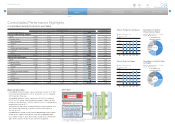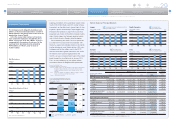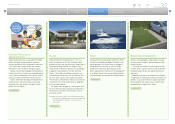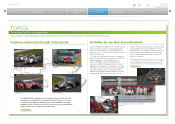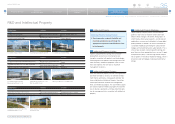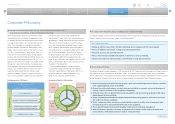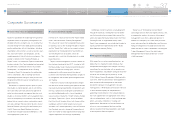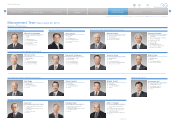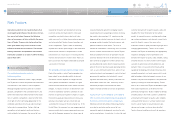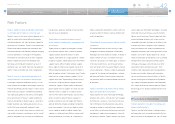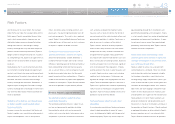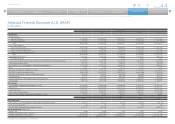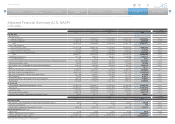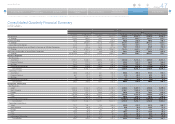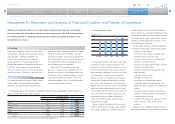Toyota 2014 Annual Report Download - page 38
Download and view the complete annual report
Please find page 38 of the 2014 Toyota annual report below. You can navigate through the pages in the report by either clicking on the pages listed below, or by using the keyword search tool below to find specific information within the annual report.
ANNUAL REPORT 2014
President’s MessagePresident’s Message
Overview of
Four Business Units
Overview of
Four Business Units
Special FeatureSpecial Feature
Review of OperationsReview of Operations
Consolidated Performance
Highlights
Consolidated Performance
Highlights
Management and
Corporate Information
Management and
Corporate Information
Investor InformationInvestor Information
Financial SectionFinancial Section
Page 38
NextPrev
ContentsSearchPrint
N Compliance
The CSR Committee comprises mainly the directors at
the executive vice president level and above as well as
representatives of the Audit & Supervisory Board. To
manage and promote activities that are important to
fulfilling the Company’s social responsibility, the
committee reviews important issues related to basic
corporate policy, overall CSR (including environmental
and social contribution initiatives), overall corporate
governance (including corporate ethics and compli-
ance) and risk management, and discusses measures
to address such issues.
Toyota has adopted an auditor system. Seven Audit
& Supervisory Board Members (including four Outside
Audit & Supervisory Board Members) play a role in
Toyota’s corporate governance efforts by undertaking
audits in accordance with the audit policies and plans
determined by the Audit & Supervisory Board. In
addition, Toyota has secured the personnel and frame-
work supporting the audit by Audit & Supervisory
Board Members. The Outside Audit & Supervisory
Board Members advise Toyota from a fair and neutral
perspective, based on their broad experience and
insight in their respective fields of expertise. While
Toyota currently does not have its own standard or
policy on independence in appointing Outside Audit &
Supervisory Board Members, the Company believes
that such appointments are appropriate since various
rules on independence, such as stock exchange regu-
lations, are used as references in making such
appointments. The state of internal controls and inter-
nal audits are reported to Audit & Supervisory Board
Members (including Outside Audit & Supervisory
Board Members) through the Audit & Supervisory
Board and the “CSR Committee,” and the status of
accounting audits is reported by independent External
Auditors to the Audit & Supervisory Board Members
(including Outside Audit & Supervisory Board
Members) through the Audit & Supervisory Board. To
enhance the system for internal audits, a specialized
organization made independent of direct control by
the management evaluates the effectiveness of the
system to secure the appropriateness of documents
regarding financial calculation and other information in
accordance with Section 404 of the U.S. Sarbanes-
Oxley Act and Article 24-4-4 (1) of the Financial
Instruments and Exchange Law of Japan. In order to
enhance the reliability of the financial reporting of
Toyota, the three auditing functions—audit by Audit &
Supervisory Board Members, internal audit, and
accounting audit by Independent External Auditors—
aid in conducting an effective and efficient audit
through meetings held periodically and as necessary
to share information and come to understanding
through discussion on audit plans and results.
Toyota’s Corporate Governance
N Accountability
Toyota has engaged in timely and fair disclosure of
corporate and financial information as stated in the
CSR Policy “Contribution towards Sustainable
Development.” In order to ensure the accurate, fair,
and timely disclosure of information, Toyota has estab-
lished the Disclosure Committee chaired by an officer
of the Accounting Division. The Committee holds
regular meetings for the purpose of preparing, report-
ing, and assessing its annual securities report, quar-
terly report under the Financial Instruments and
Exchange Law of Japan, and Form 20-F under the
U.S. Securities Exchange Act, and also holds
extraordinary committee meetings from time to time
whenever necessary.
N Basic Policy Regarding the System to Secure
the Appropriateness of Business
Toyota, together with its subsidiaries, has created and
maintained a sound corporate climate based on the
“Guiding Principles at Toyota” and the “Toyota Code of
Conduct.” Toyota integrates the principles of problem
identification and continuous improvement into its
business operation process and makes continuous
efforts to train employees who will put these principles
into practice.
Corporate Governance
D Read more
R&D and Intellectual Property Corporate Philosophy Corporate Governance [2 of 2] Management Team Risk Factors
Emphasizing Front-line Operations +
Multidirectional Monitoring
Board of Directors
(including Outside Directors)
Officers Responsible for Business
Operations (by center, region,
function and process)
Shareholders
Disclosure Committee
Internal Auditing
Department
(Internal control systems)
International Advisory Board
Labor-Management Council
JointLabor-Management
Round Table Conference
CSR Committee
•CSR/EnvironmentCouncil
•CorporateGovernanceCouncil
•RiskManagementCouncil
External Accounting Auditor
(Audit of consolidated financial
statements and internal
control over financial reporting)
Audit & Supervisory Board
(More than half of the members
are outside Audit &
Supervisory Board members)


